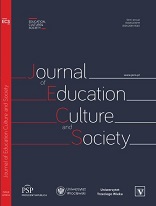Is social software a new mode of second-language learning in the information age?
Is social software a new mode of second-language learning in the information age?
Author(s): H. B. PatelSubject(s): Foreign languages learning
Published by: Fundacja Pro Scientia Publica
Keywords: Social learning; social media; information age; information technologies; education; internet; pedagogy
Summary/Abstract: The basic characteristics of social media mirror much of the rhetoric and thinking around educational reform in the modern world context. The basic cultural relevance of social media to young people enables them to learn how to bring their social life into the matrix of school activities. It also provides young learners with different audiences for different activities. Today, social media are probably the critical component in enabling individuals, both teachers and learners, to construct their own personal learning networks. Joining, building, growing and managing digital communities, whether relatively open or relatively closed, enables teachers and learners to connect with others with similar interests and to learn from other participants in those communities.
Journal: The Journal of Education, Culture, and Society
- Issue Year: 4/2013
- Issue No: 2
- Page Range: 116-123
- Page Count: 8
- Language: English

